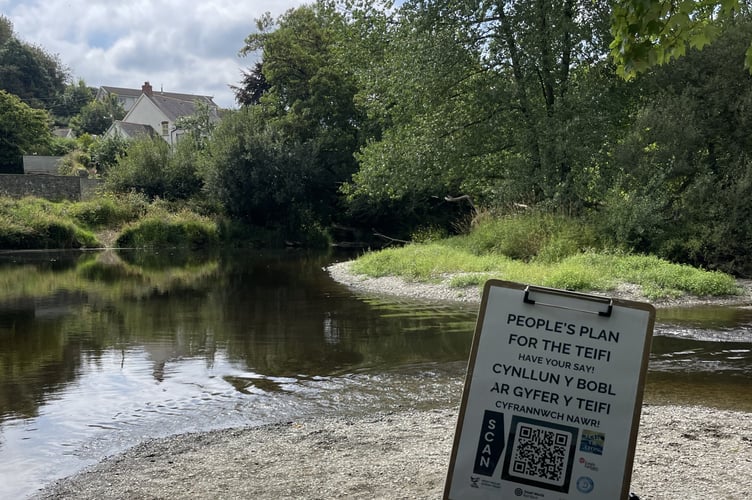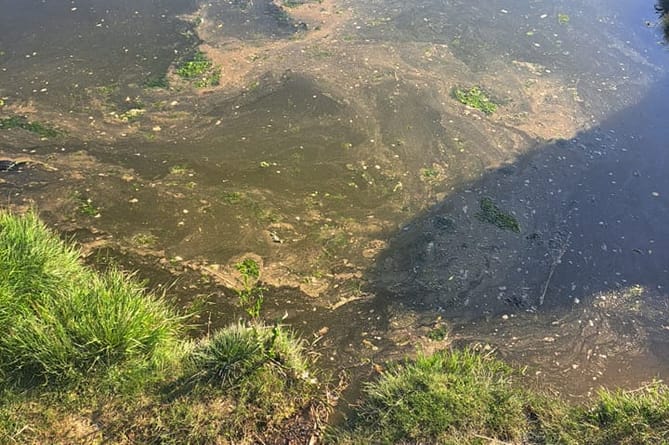West Wales has done it, winning Top of the Poops for 2024 for the most hours of sewage spilling into our waterways in 2024 out of all of England and Wales.
Ceredigion Preseli won the accolade for the poopiest place – receiving 94,836 hours of sewer overflow issuing straight into its rivers, streams and seas.
Carmarthenshire’s Caerfyrddin came a close second with 88,840 hours, Gwynedd’s Dwyfor Meirionnydd taking third place with 88,682 hours and Mid and South Pembrokeshire coming seventh with 58,148 hours of overflow.
So it’s official – West Wales is the poopiest place to be – with the River Teifi coming top for Welsh rivers, fifth overall, receiving 22,288 hours of overflow.
Residents and people in power have expressed their “shock” at the “unacceptable” news, though the area has been in the top 10 for years.
Issuing a joint statement, MPs Ben Lake for Ceredigion, Ann Davies for Caerfyrddin and Liz Saville Roberts for Dwyfor Meirionnydd said: “These shocking sewage overflow figures pose a serious threat to public health, the environment, and the wellbeing of our communities.
“It is unacceptable that three of the worst-affected areas are in Wales.
“As Plaid Cymru MPs representing the three worst-hit constituencies across both Wales and England, we have written to Dŵr Cymru for an urgent explanation of why pollution levels in Ceredigion Preseli, Caerfyrddin, and Dwyfor Meirionnydd are particularly severe.
“Our constituents deserve absolute clarity on what urgent action is being taken to fix this appalling situation.”

Dŵr Cymru (Welsh Water) is the non-profit water company responsible for the achievement.
One resident said Dŵr Cymru should be “really embarrassed” after the company announced in January that residents would see a 27 per cent increase in their water bills from April – going up to 42 per cent by 2029/30 - though this is said to fund a 68 per cent increase in investment into water infrastructure solving problems like the excessive sewage overflows.
Another local said the results were “quite an achievement considering how many properties have their own septic tanks”.
A third resident called for Dŵr Cymru bosses to “face prosecution” and a “massive pay cut” and that maybe the spills wouldn’t happen if the company “actually spent the money on infrastructure”.
Despite calling themselves a not-for-profit company, Dŵr Cymru CEO Peter Perry received £892,000 in remuneration in 2021, £675,000 in 2022, and £792,000 in 2023.
Quizzing Perry, MP for Mid and South Pembrokeshire Henry Tufnell asked whether his pay was “justified” during a Westminster environment committee session in early March, asking: “If you take into consideration what we've talked about with water security, environmental performance, water quality with the public health element to it, do you think level of pay is justified and that's in alignment with your not-for-profit model?”
Perry explained that a recent £91,000 bonus was only in fact 25 per cent of what he could earn, stating that “100 per cent of our variable pay is entirely based on performance”, whilst interim Chief Financial Officer Samantha James explained Perry’s fixed salary was “one of the lowest in the sector”.
So why is West Wales Top of the Poops?
West Wales is accompanied at the top of the charts by another Welsh constituency - Brecon, Radnor and Cwn Tawe coming tenth, whilst Penrith and Solway and Westmorland and Londsdale in Cumbria coming sixth and ninth – meaning five of the 10 Top of the Poops are in Wales, whilst two others are in the Lake District.
This is something Dŵr Cymru are keen to stress – Wales, like the Lake District, gets more rain than other parts of the UK due to its position next to the Atlantic, so overflow from excessive rainfall is more common.
The mechanism used to stop the system from being overloaded with heavy rain is called Combined Sewage Overflow - this stops sewage from backing up into homes and streets, allowing the excess water (and sewage) to flow out into waterways instead, where it can diffuse and wash away.
There are also more sewage networks in rural Wales because of how spread out the population is, leading to “more assets per head”.
A Dŵr Cymru spokesperson explained: “The constituencies are made up of a number of smaller communities.
“All these communities are served by smaller sewerage networks and storm overflows, which are essential to ensure networks do not become overwhelmed and flood properties.
“There will be a lot more wastewater assets in a West Wales constituency than in an inner city.
“Then there is the size of these pipes, which are a lot smaller than the ones serving larger towns and cities.
“But because the UK monitors frequency of operation (an overflow event) and for how long (duration) rather than volumes, a small pipe in West Wales scores the same as a larger pipe such as the Thames tideway sewer, even though the amount of sewage and the impact will be very different.”
The argument could be that Wales should get bigger pipes to deal with the heavy rain – which is only getting heavier and more erratic (Dŵr Cymru reports an increase in “severe weather events due to climate change”) - but digging up and refitting the old sewage pipes is “unaffordable”, as is removing the storm overflows, says Dŵr Cymru.
Another thing to consider is the type of sewers – pre-1970s builds have combined rainwater and wastewater pipes, so they are more likely to get clogged or overloaded - with Wales having some of the oldest housing stock in the UK and Europe, that’s a lot of old sewers.
However this doesn’t explain all the problems – water companies are legally allowed to let sewage flow freely into waterways for up to 1,000 hours as long as rainfall is greater than 4mm per hour.
Afonydd Cymru, the umbrella organisation for Welsh river trusts, analysed the 2024 data on the top 20 most frequently spilling assets.
The analysis found that the top 20 assets were only overspilling legally 1 per cent of the time – each asset individually spilling between 3587 hours and 6267 hours across the year.
In 2024, 276 assets spilled for more than 1,000 hours.
Afonydd Cymru added that the type of failure was often not due to blockages which Dŵr Cymru often blame (the company lobbied for plastic-containing wet wipes to be banned for clogging pipes – due to come into force in 2026) but instead due to “failure at the wastewater treatment works” - meaning either a lack of storm tank capacity, or with the amount of wastewater a pumping station can accept before it overflows.
Are flowers the solution?
Record-breaking investment into Wales’ waterways has been announced, with £4bn from Dŵr Cymru.
A Dŵr Cymru spokesperson said: “We are determined to play our part to improve river and bathing water quality and in the next five years we are investing £2.5bn on projects to improve the environment, including £889m on improving storm overflows.
“The total removal of storm overflows from our system is unaffordable and would take decades and therefore is not an option, but what is in our control is the ability to target investment on storm overflows that have the biggest environmental impact.”
For this reason, Cardigan wastewater treatment is getting a £20m expansion, aiming to reduce the pollution entering the river Teifi by stopping the plant from getting overwhelmed with seawater.
Another solution is to stop rainwater from overloading the system to begin with by addressing surface water runoff.
This is something environmental campaigner Joe Wilkins says multiple sectors can look at.

The 26-year-old from Clarach is currently working with his family’s building development business BDW Consultancy Ltd to move towards nature-friendly buildings and properties: “Any increase in housing alongside a village is going to be a big increase proportionally on the pressure to the sewers – this is something that local authorities, Dŵr Cymru, and developers must solve.
“We want people to stay or move to the area, but this needs to be done sympathetically, which is a big focus for me.
“Politicians love to pit housing against biodiversity, whilst developers suggest we won’t meet our housing targets unless we ditch environmental protection regulations, but it doesn’t have to be one or the other.
“If you’re working with nature, reducing the risk of flooding by planting trees and hedgerows, this can reduce rainwater going into drains, or at least it will enter the system slower.
“Throw climate change on top – where we’ve had one of the wettest years followed by six weeks of little rain - the landscape is getting saturated then baked dry.
“Without proper land management, the water will run straight into the drains.
“I worked with a farmer in Newcastle Emlyn who remembered when he was younger it taking days for rain on the hills to reach the river – now it’s hours.
“Where before the water would have soaked into a field, if it’s been tarmacked over, you’re reducing the ability of the ground to hold water.
“We can’t just look at flood and sewage management; we’ve got to look at the whole picture.
“Having intact eco-systems isn’t a threat to community or housing, it bolsters it.”
Ceredigion County Council has taken up this challenge - recently undertaking eight farm water quality improvement works, installing six sustainable urban drainage schemes and restricting livestock access to waterways (another key water pollutor) with 9km of riparian fencing.
The council has now become a “demonstrator catchment for explorative and innovative solutions and information sharing nationally”.
Joe also works on community campaigning to protect Wales’ waterways, most recently helping West Wales River Trust to complete their ‘People’s Plan for the Teifi’ involving over 300 residents.

He says everyone has a part to play in helping improve the health of our waterways: “None of this can be done without community empowerment.
“Dŵr Cymru, Natural Resources Wales (NRW), Ceredigion County Council don’t have the resources to monitor the water quality on every river and tributary, but communities can.
“We just need to be supported.
“Save the Teifi campaign group are doing amazing citizen science to record water quality levels – it's not about dobbing people in, it’s about making things better.
“Septic tanks and private sewers, because they’re not Dŵr Cymru assets, can be more difficult to deal with if there’s a fault – we've had a few cases locally of beautiful streams being polluted with faulty septic tanks – they go under the radar but if you have a private sewage system, make sure its maintained.
“It may seem like a small amount, but if it's continual and everyone's tanks are doing it, it adds up.”
Dŵr Cymru is investing in green solutions like this – planting flower beds on roofs to reduce water runoff, looking at solutions to runoff contributions from highway drains and misconnected land drains, and using reed beds and constructed wetlands to treat waste water like in a new £13m project in Pont-y-felin Lane in Pontypool.

NRW, the regulator for Welsh water companies, will be doing their bit to hold them accountable.
Sian Williams, Head of Operations from NRW, said: “New data on the health of Wales’s water environment highlights the need and urgency for us all to accelerate efforts to drive down sources of pollution.
“We continue to strengthen our regulation of the water industry and clamp down on sewage spills and poor performance.
“As part of this, we have started recruitment to introduce a new compliance team whose job will be to monitor water company discharges closely, and to take action to improve poor performance.
“Over the next five years, we will be closely monitoring the water companies in their delivery of an incredibly ambitious environment programme, making sure that they achieve the improvements needed to rectify the discharges that are known to cause the most harm to the environment.
“We have pushed hard for this programme, which will involve record levels of action and investment by water companies to benefit people and nature in Wales.”




